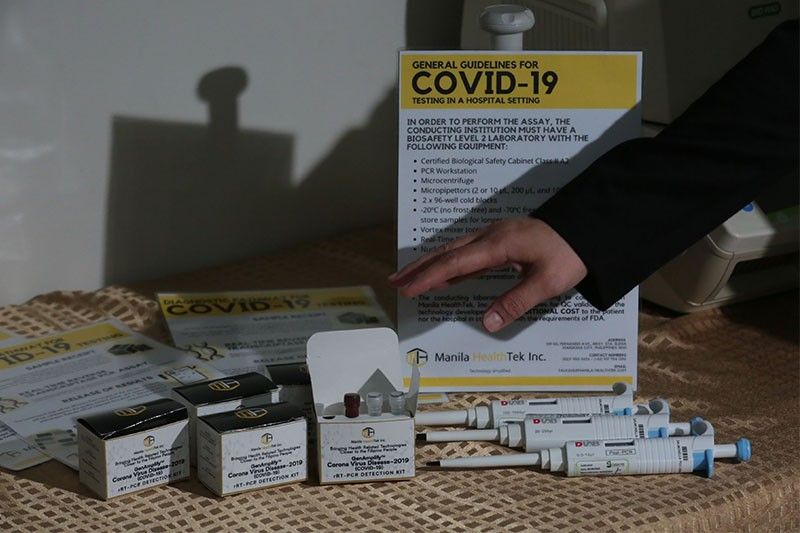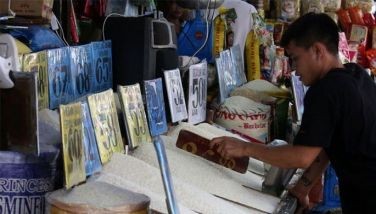FDA OKs 5 rapid COVID-19 test kits

MANILA, Philippines (Update 1:57 p.m.) — The country's Food and Drug Administration approved the use of five rapid test kits for the new coronavirus as public clamor for mass testing continues to grow.
In a statement Monday, FDA Director General Eric Domingo said the agency approved rapid test kits registered and used in countries with advanced technology and wide experience with COVID-19 such as China and Singapore.
Rapid test kits will yield a faster result than polymerase chain reaction-based kits currently being used in laboratories across the archipelago. But Domingo stressed the importance of having a trained health professional to evaluate and interpret the test results.
“We have to be cautious in using these rapid test kits because they measure antibodies and not the viral load itself. The body takes time to develop antibodies and this might give a negative result for patients who have been infected but antibodies have not yet developed,” he said.
“A positive result due to cross reaction and with other bacteria or viruses is also possible, which is why a confirmatory PCR-based test is still required,” the FDA director general added.
The Department of Health earlier rejected the use of rapid test kits because such tests can give patients a false sense of confidence that they are not infected with the highly-contagious illness.
The FDA will require the label of the rapid test kits to state the following: “This product is strictly for medical professional use only and not intended for personal use. The administration of the test and the interpretation of results should be done by a trained health professional. Confirmatory testing is required.”
The agency also approved an additional PCR-based test kit from Abbott Laboratories, which can detect the virus within five minutes. This brought the total number of PCR-based test kits approved by FDA for commercial use to 17.
Big jumps in the number of COVID-19 cases in the Philippines were attributed to the arrival of donated test kits and opening of new laboratories processing samples across the archipelago.
The Philippines lags behind its regional peers in terms of testing, with only 3,113 people tested since late January.
In virus-hit countries like South Korea and Singapore, widespread testing is crucial in their fight against the pandemic as it allows authorities to isolate and treat infected people.
Approval of locally-made test kits seen this week
The FDA is expected to issue the locally-made test kits a certificate of product registration— which allows its commercial sale—on April 3, the Department of Science and Technology said Monday.
“The field validation for the COVID-19 testing kits is ongoing and is expected to be finished by Wednesday, April 1,” DOST said, adding requirements for CPR certification will be also submitted on Wednesday.
The SARS-CoV-2 PCR detection kit was developed by scientists from the University of the Philippines National Institutes of Health and the Philippine Genome Center. It is manufactured by Manila HealthTek Inc.
“The Manila HealthTek Inc. reported that the first batch of reagents has arrived which will enable them to start the manufacturing process to create additional kits that can accommodate 120,000 tests,” DOST said.
A total of 1,300 testing kits good for 26,000 tests will be manufactured and prioritized for field implementation and distribution to the Philippine General Hospital, Makati Medical Center, The Medical City, Vicente Sotto Memorial Medical Center in Cebu City, Southern Philippines Medical Center in Davao City and Baguio General Hospital.
Manila HealthTek will sell the remaining kits good for 94,000 test commercially at around P1,300 per kit—cheaper than the units currently being used in hospitals which cost about P8,000.
The DOH on Sunday reported 343 new COVID-19 cases, marking the country’s largest daily increase in infections. This raised the nation’s total number of infections to 1,418 with 71 deaths.
Follow this page for updates on a mysterious pneumonia outbreak that has struck dozens of people in China.
New Zealand Prime Minister Chris Hipkins says on Sunday that he had contracted COVID-19, testing positive at a key point in his flailing campaign for re-election.
Hipkins saYS on his official social media feed that he would need to isolate for up to five days -- less than two weeks before his country's general election.
The leader of the centre-left Labour Party said he started to experience cold symptoms on Saturday and had cancelled most of his weekend engagements. — AFP
The World Health Organization and US health authorities say Friday they are closely monitoring a new variant of COVID-19, although the potential impact of BA.2.86 is currently unknown.
The WHO classified the new variant as one under surveillance "due to the large number (more than 30) of spike gene mutations it carries", it wrote in a bulletin about the pandemic late Thursday.
So far, the variant has only been detected in Israel, Denmark and the United States. — AFP
The World Health Organization says on Friday that the number of new COVID-19 cases reported worldwide rose by 80% in the last month, days after designating a new "variant of interest".
The WHO declared in May that Covid is no longer a global health emergency, but has warned that the virus will continue to circulate and mutate, causing occasional spikes in infections, hospitalisations and deaths.
In its weekly update, the UN agency said that nations reported nearly 1.5 million new cases from July 10 to August 6, an 80% increase compared to the previous 28 days. — AFP
The head of US intelligence says that there was no evidence that the COVID-19 virus was created in the Chinese government's Wuhan research lab.
In a declassified report, the Office of the Director of National Intelligence (ODNI) says they had no information backing recent claims that three scientists at the lab were some of the very first infected with COVID-19 and may have created the virus themselves.
Drawing on intelligence collected by various member agencies of the US intelligence community (IC), the ODNI report says some scientists at the Wuhan lab had done genetic engineering of coronaviruses similar to COVID-19. — AFP
Boris Johnson deliberately misled MPs over Covid lockdown-breaking parties in Downing Street when he was prime minister, a UK parliament committee ruled on Thursday.
The cross-party Privileges Committee said Johnson, 58, would have been suspended as an MP for 90 days for "repeated contempts (of parliament) and for seeking to undermine the parliamentary process".
But he avoided any formal sanction by his peers in the House of Commons by resigning as an MP last week.
In his resignation statement last Friday, Johnson pre-empted publication of the committee's conclusions, claiming a political stitch-up, even though the body has a majority from his own party.
He was unrepentant again on Thursday, accusing the committee of being "anti-democratic... to bring about what is intended to be the final knife-thrust in a protracted political assassination".
Calling it "beneath contempt", he said it was "for the people of this to decide who sits in parliament, not Harriet Harman", the veteran opposition Labour MP who chaired the seven-person committee. — AFP
- Latest
- Trending
































